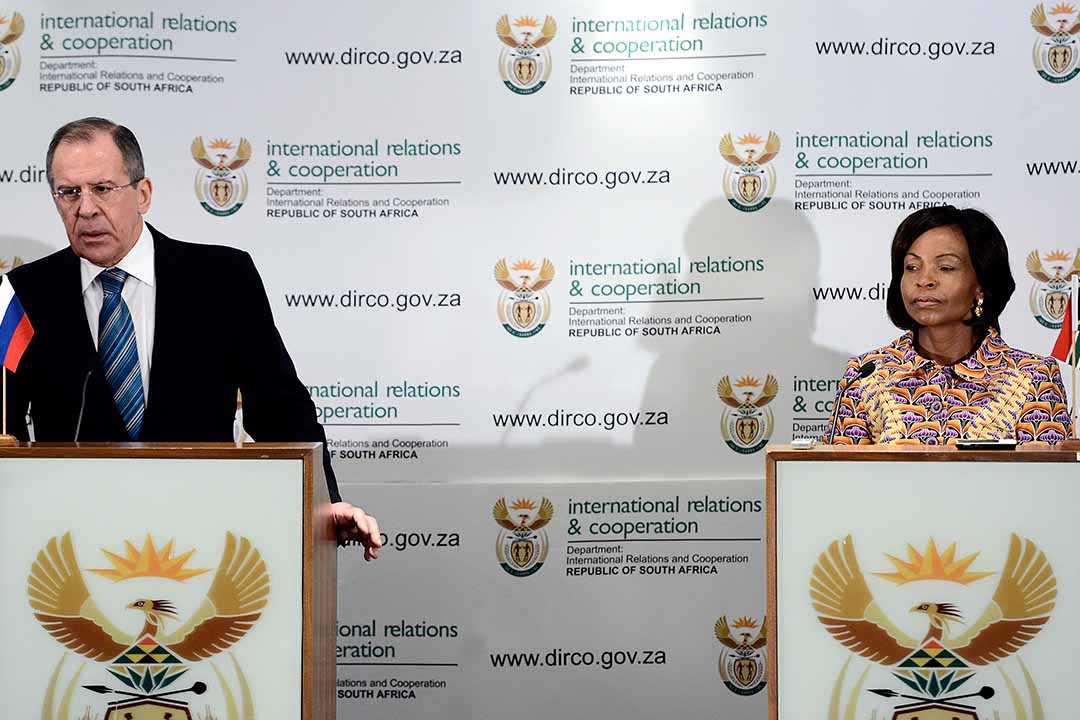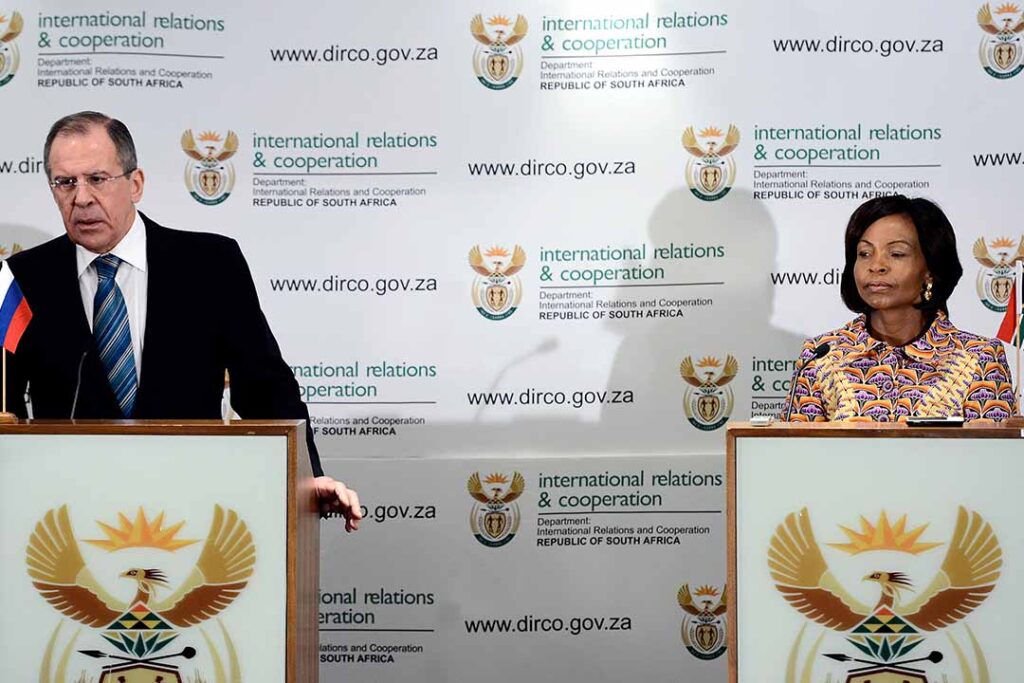Nuclear weapons: the African view
African states argue that the total elimination of nuclear weapons is the only guarantee against their use or threat of use

The climate crisis – the process of climate change – and its far-reaching and unprecedented challenge to all aspects of society, is often (and perhaps correctly) viewed as the defining issue of our time. At the same time, another threat to the future of humankind while not new, continues to haunt the majority of the international community – the possibility that nuclear weapons will be used either by design, accident or miscalculation. As Egypt told the UN General Assembly in October 2018, “rising levels of tensions at the global level coupled with rapid technological developments make the risk of intentional or accidental use of nuclear weapons at one of its highest levels since the Cold War era”. With the Review Conference of the Treaty on the Non-Proliferation of Nuclear Weapons (NPT) due to take place in April and May this year in New York, this article focuses on African initiatives to bring about a world without nuclear weapons.
All too often, the role of African states in advocating for a world free of nuclear weapons is under-reported, or perceived as marginal, as they strive to cope with what some regard as of more immediate concern, namely: the alleviation of poverty, the provision of housing, education and health care and the illicit trade in small arms and light weapons. All African states, except for South Sudan, are party to the 1968 Treaty on the Non- Proliferation of Nuclear Weapons (NPT). This means that they have undertaken not to acquire or manufacture nuclear weapons. South Africa remains the only country to have manufactured nuclear weapons and then to take a unilateral decision to renounce and dismantle its nuclear weapons programme (an account of this is given in a 2014 book by Nic von Wielligh and Lydia von Wielligh- Steyn, The Bomb). The NPT, which came into force in 1970 and was extended indefinitely in 1995, is regarded as the cornerstone of the global nuclear non-proliferation regime. The NPT is designed to prevent the spread of nuclear weapons, further the goal of nuclear disarmament, and promote co-operation in the peaceful uses of nuclear energy.
The treaty defines two categories of parties – nuclear weapon states (NWS) and nonnuclear weapon states (NNWS). NWS are defined as the five states that detonated a nuclear device before January 1967 – China, France, the then Soviet Union, the United Kingdom (UK) and the United States (US). All other UN member states, which have ratified the NPT, are regarded as NNWS that have agreed not to manufacture or otherwise acquire nuclear weapons and, in accordance with the International Atomic Energy Agency (IAEA), to prevent diversion of nuclear energy from peaceful uses to nuclear weapons or other nuclear explosive devices. The five NWS, on the other hand, are obliged to pursue nuclear disarmament negotiations in good faith. The NPT entered into force some 50 years ago, and in 1946 the first UN General Assembly resolved to establish a commission “to deal with the problems raised by the discovery of atomic energy and other related matters” and to make specific proposals on the control of atomic energy and on “the elimination from national armaments of atomic weapons”.
Nevertheless, 14,000 nuclear warheads remain in existence today. Notwithstanding numerous attempts to ensure that the NWS fulfil their side of the “grand bargain” – to pursue disarmament – the states possessing these weapons continue to argue that it is within their rights to keep their nuclear arsenals for as long as the current global political and security conditions remain unfavourable. Some analysts argue that this seeks to legitimise their perpetual possession of such arms. Most NNWS, including African states, argue that the total elimination of nuclear weapons is the only guarantee against the use, or threat of use, of such weapons and that the very possession of nuclear weapons encourages nuclear proliferation. In 2004, the African Union’s Common African Defence and Security Policy identified “the accumulation, stockpiling, proliferation and manufacturing of weapons of mass destruction, particularly nuclear weapons, chemical and biological weapons, unconventional long-range and ballistic missiles” as common external threats to continental security in Africa.
African states, both individually and as members of regional groupings within the UN system such as the Africa Group, the Arab Group and the Non-Aligned Movement (NAM), continue to affirm the urgent need for the NWS to diminish the role of nuclear weapons in their security policies and to ensure the early entry into force of the Comprehensive Nuclear-Test- Ban Treaty (CTBT) as a meaningful step in the realisation of a systematic process to achieve nuclear disarmament. Besides Egypt, only the African states of Mauritius, Somalia and South Sudan have neither signed nor ratified this particular treaty. At the same time, it is also important to note that African states reaffirm their inalienable right to pursue peaceful uses of nuclear energy in terms of Article IV of the NPT. Their view is that states can be totally committed to the non-proliferation of nuclear weapons, while also recognising the developmental benefits that nuclear material and related applications provide.
International co-operation for the peaceful application of such material should therefore not be undermined in the quest to prevent the spread of nuclear weapons. The lack of urgency and seriousness with which nuclear disarmament has been approached in the NPT context led to the negotiation and adoption in 2017 of the Treaty on the Prohibition of Nuclear Weapons (TPNW). An April 2019 statement to the Security Council by Ambassador Jerry Matjila, South Africa’s permanent representative to the UN, reflects Africa’s position, namely that the very possession of nuclear weapons by some countries encourages nuclear proliferation by others and that “efforts to prevent the proliferation of nuclear weapons should be matched by an equal commitment by the nuclear weapon states to eliminate all nuclear weapons in a verifiable and irreversible manner”. The TPNW is the first legally binding international agreement to comprehensively prohibit nuclear weapons.
Proponents of the treaty portray this as a key step towards achieving a world without nuclear weapons, but many states possessing nuclear weapons and their allies have been highly critical of the treaty. These latter states have argued, among other things, that the TPNW ignores the increasingly complex international security environment and that it may negatively impact on the NPT and its review cycle mechanism. That is, they claim that the TPNW undermines the step-by-step approach to nuclear disarmament, including the movement towards entry into force of the CTBT. Nevertheless, the TPNW was adopted at the UN on 7 July, 2017, with the support of 122 states, including 42 African states. The treaty will enter into force once 50 states have ratified or acceded to it. As of 26 October, 2019, there were 79 signatories and 33 states parties. These states are of the view that the more complex the international security environment becomes, the higher the risk of the use of nuclear weapons – thus making nuclear disarmament more urgent.
Furthermore, given their catastrophic humanitarian consequences, nuclear weapons cannot be used in a manner consistent with the rules and principles of international humanitarian law. Nuclear weapons do not increase security, but rather undermine regional and international peace and security. South Africa ratified this treaty in February 2019. The “ratification… sends a positive signal of our continued commitment towards the achievement of a world free from the threat posed by nuclear weapons and ensuring that nuclear energy is used solely for peaceful purposes,” the then minister of international relations and co-operation, Lindiwe Sisulu, said. Her view expresses those of many African states. Another important example of Africa’s commitment to a world free from nuclear weapons is the African Nuclear-Weapon Free Zone Treaty (Treaty of Pelindaba), which was approved by African heads of state on 23 June, 1995 and entered into force in July 2009.
The Treaty declares Africa a zone free from nuclear weapons and provides for the promotion of co-operation in the peaceful uses of nuclear energy. It requires complete nuclear disarmament by African states and aims to enhance both regional and global peace and security. Basically, the Treaty of Pelindaba seeks to ensure that nuclear weapons are not developed, produced, tested or otherwise acquired or stationed anywhere on the African continent or its associated islands. Presently, the treaty has 41 parties with (only) 14 states still to deposit their instruments of ratification with the AU. Parties also pledge to prohibit the testing of nuclear devices and the dumping of radioactive waste, while improving the physical protection of their nuclear materials and facilities. Uniquely, the Treaty of Pelindaba also prohibits armed attacks on nuclear installations, including nuclear research or power reactors.
Protocols to the treaty are designed to ensure that non-African states respect the status of the zone and undertake not to use or threaten to use nuclear weapons against any African country. Only Spain and the US have not ratified the relevant protocols. Spain, while not a nuclear-armed state, is de facto in control of three territories within the zone – the Canary Islands and two coastal cities in Morocco, Ceuta and Melilla. Spain claims these are integral parts of the European Union and therefore should not be included within the African nuclear weapons free zone. Spain has also argued that the Treaty of Pelindaba does not contain any global nonproliferation or disarmament provisions that it has not already signed. The US leases Diego Garcia from the UK as a military base. Both the UK and the US argue that the British Indian Ocean territory cannot be included in the geographical area of the Treaty of Pelindaba.
The AU, however, considers the islands to be part of Mauritius. In February last year, the International Court of Justice in The Hague stated that the island was not lawfully separated from Mauritius and that the UK should end its control of the Chagos Islands in the Indian Ocean “as rapidly as possible”, according to the judgment. Parties to the Treaty of Pelindaba have established the African Commission on Nuclear Energy (AFCONE) to ensure compliance with the treaty. Hosted in South Africa, AFCONE’s overall goal is “to ensure safety, security and socioeconomic progress in Africa through coordinating, strengthening and developing continental nuclear peaceful applications programmes and playing a dynamic role in disarmament and non-proliferation affairs”. It therefore plays a key role in advancing the peaceful application of nuclear science and technology in Africa and in bringing much-needed support to states parties to fully benefit from nuclear sciences and technology applications in the areas of health, agriculture and energy.
Both the continued existence of nuclear weapons and climate change are existential threats to humanity. Africa contributes the least to global emissions and has forsworn nuclear weapons, but the continent cannot argue that both are now “northern” problems to be ignored by the “global south”. Africa shares in the responsibility to enhance international peace and security. As a Nuclear-Weapons-Free Zone and as supporters of the TPNW, African states have reinforced their commitment to global nuclear disarmament and non-proliferation objectives of the NPT and the CTBT.



